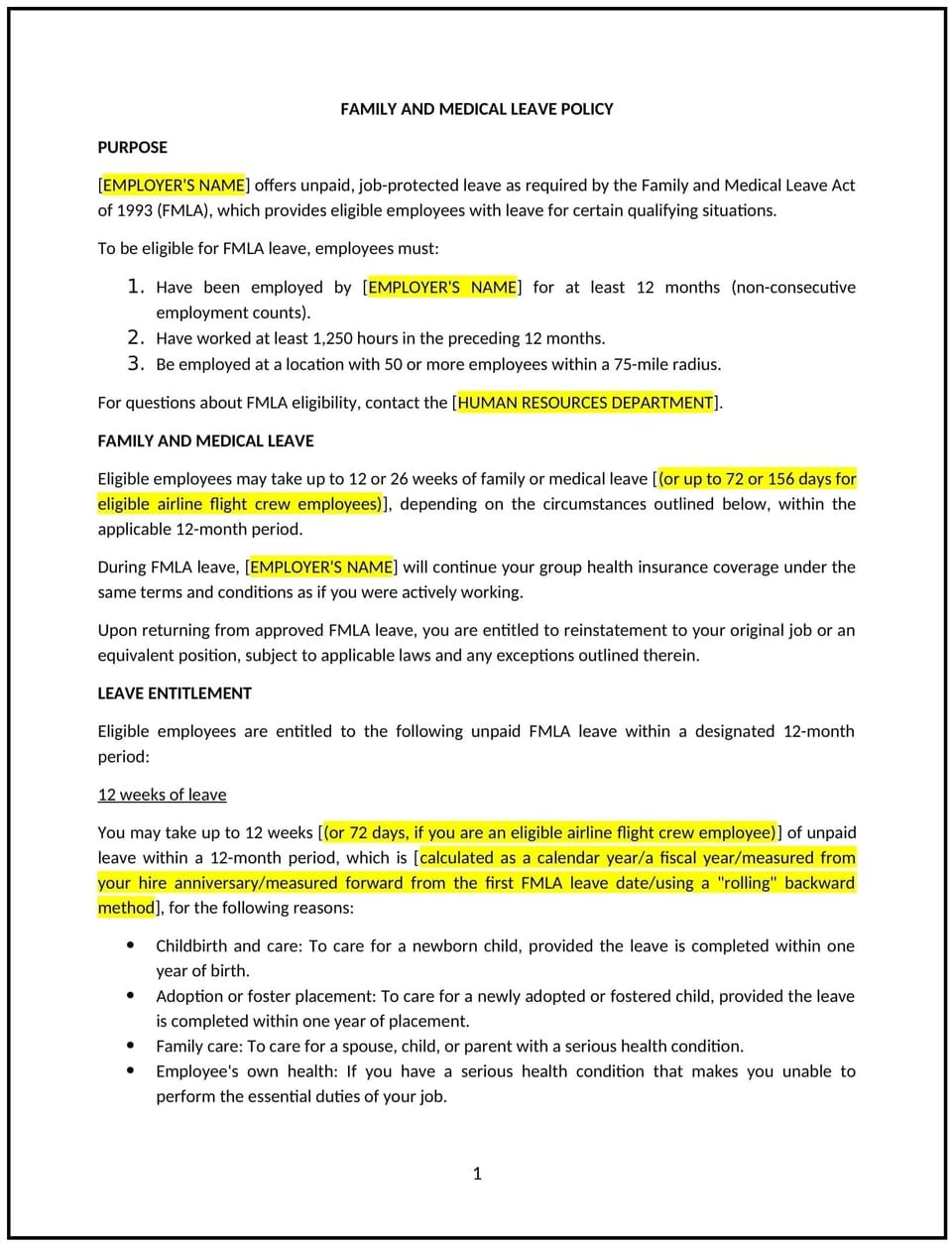Family and medical leave policy (California): Free template

Family and medical leave policy (California)
In California, a family and medical leave policy provides businesses with guidelines for granting employees time off for qualifying personal and family-related reasons, such as medical conditions, the birth of a child, or caring for a family member. This policy supports compliance with California’s Family Rights Act (CFRA), the federal Family and Medical Leave Act (FMLA), and other applicable laws.
This policy outlines employee eligibility, leave duration, and procedures for requesting leave. By implementing this policy, California businesses can foster a supportive workplace while ensuring operational continuity and compliance with legal obligations.
How to use this family and medical leave policy (California)
- Define eligibility: Specify which employees qualify for leave based on hours worked and length of service, as required under CFRA and FMLA.
- Outline qualifying reasons: Provide a list of circumstances eligible for leave, such as serious health conditions or the need to bond with a new child.
- Set leave duration: Clearly state the maximum leave allowed, typically up to 12 weeks in a 12-month period under CFRA and FMLA.
- Establish request procedures: Detail how employees should request leave, including notice requirements and supporting documentation, such as medical certifications.
- Communicate return-to-work guidelines: Clarify expectations for returning to work, including any required documentation or accommodations.
Benefits of using this family and medical leave policy (California)
This policy offers several advantages for California businesses:
- Supports compliance: Reflects CFRA, FMLA, and other applicable laws, ensuring lawful management of family and medical leave.
- Promotes fairness: Provides clear and consistent guidelines for managing employee leave requests.
- Enhances employee morale: Demonstrates the business’s commitment to supporting employees during personal or family challenges.
- Reduces risks: Minimizes the potential for disputes or claims by establishing clear procedures and adherence to legal standards.
- Encourages planning: Helps the business manage workloads and minimize disruptions during employee absences.
Tips for using this family and medical leave policy (California)
- Reflect California-specific laws: Ensure the policy aligns with CFRA, which may provide broader protections than federal FMLA requirements.
- Train managers: Educate supervisors on handling leave requests, maintaining confidentiality, and avoiding potential discrimination.
- Monitor leave usage: Track employee leave to ensure compliance with legal limits and support operational planning.
- Provide flexibility: Accommodate employees’ needs where possible, such as offering intermittent leave when required by law.
- Review regularly: Update the policy to reflect changes in California laws or workplace practices.
Q: How does this policy benefit the business?
A: This policy supports compliance with California and federal leave laws, promotes employee well-being, and ensures a consistent approach to managing leave.
Q: What types of situations qualify for leave under this policy?
A: Qualifying reasons include serious health conditions, caring for a family member, bonding with a new child, or managing responsibilities related to military deployment.
Q: How does this policy support compliance with California laws?
A: The policy reflects CFRA and FMLA requirements, ensuring lawful and fair management of family and medical leave.
Q: What steps should employees take to request leave?
A: Employees should provide written notice, complete required forms, and submit any necessary documentation, such as medical certifications, as outlined in the policy.
Q: How can the business manage workloads during an employee’s leave?
A: The business can reassign tasks, hire temporary staff, or adjust schedules to maintain productivity while supporting the employee’s leave.
This article contains general legal information and does not contain legal advice. Cobrief is not a law firm or a substitute for an attorney or law firm. The law is complex and changes often. For legal advice, please ask a lawyer.


